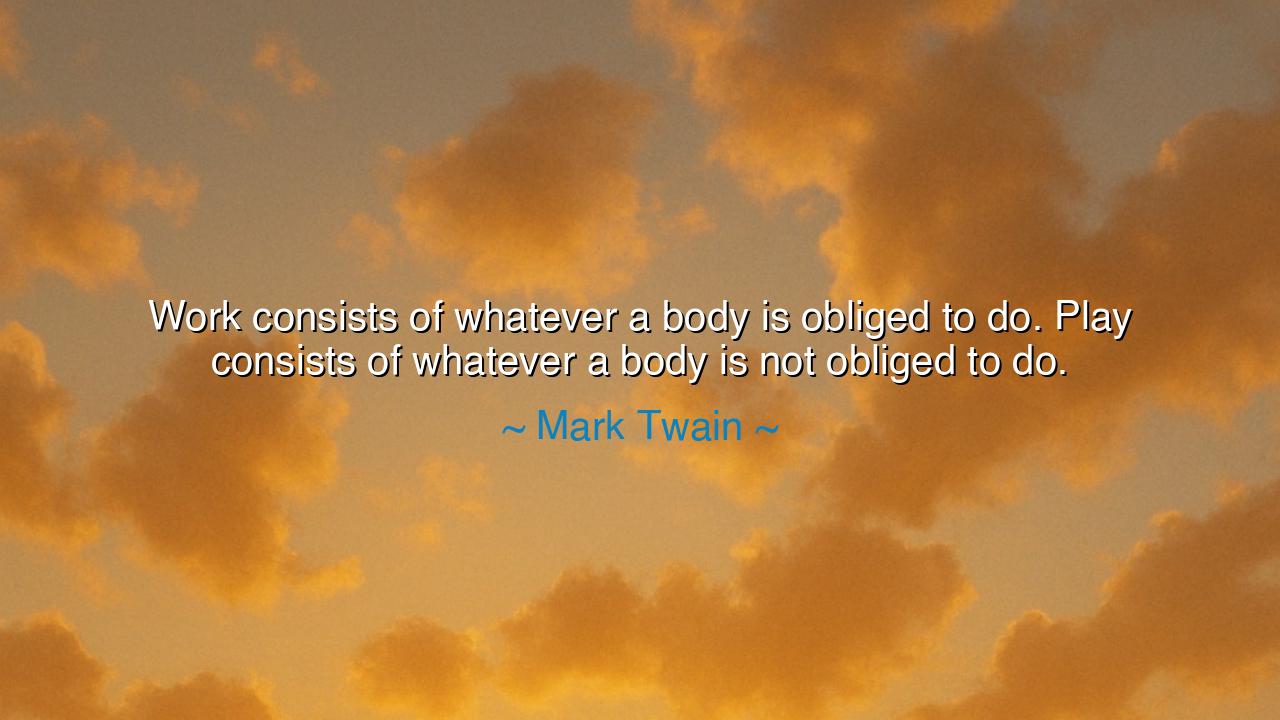
Work consists of whatever a body is obliged to do. Play consists
Work consists of whatever a body is obliged to do. Play consists of whatever a body is not obliged to do.






The ever-perceptive Mark Twain, master of wit and observer of human nature, once declared: “Work consists of whatever a body is obliged to do. Play consists of whatever a body is not obliged to do.” In these words, he reveals a profound truth about the spirit of freedom and the weight of duty. It is not the task itself that defines its nature, but the heart’s relationship to it. What is done under compulsion becomes work, while what is done from joy or desire becomes play.
Work, as Twain describes, is born from necessity. It is the plowing of fields to stave off hunger, the building of homes to ward against storms, the endless tasks society demands of its people. Though work may bring survival and even progress, it often carries the shadow of burden, for it is bound by rules, expectations, and the ever-pressing voice of obligation. The body moves, but the spirit may feel chained, longing for freedom beyond the demands of the day.
Play, in contrast, springs from the well of the soul. It is the dance, the song, the invention, or the act of exploration done simply because one wills it. In play, there are no chains, only the boundless expression of creativity and delight. What others may see as meaningless, the heart sees as sacred, for in those moments, life is lived purely and fully. Even the most difficult task, when chosen freely, transforms into play, proving that joy resides not in the act itself but in the freedom behind it.
The origin of this wisdom lies deep in the human experience. From the earliest tribes gathered around the fire, work was necessary for survival, while play was the realm where myths were told, games were played, and art was born. Twain, with his sharp insight, reminds us that this division still lives within us today. It is not wealth or power that determines happiness, but whether our days are filled with freedom or burden.
Thus, let this teaching be carried forward: seek to turn work into play by aligning duty with passion. When the heart finds joy even in obligation, the chains of compulsion dissolve, and life itself becomes a dance. For in the balance between what we must do and what we choose to do lies the path to true harmony and fulfillment.






AQTran Nguyen Anh Quan
I think this quote hits on an important distinction between freedom and responsibility. But does this mean that we should aim to eliminate all obligations in life for pure enjoyment? Is it realistic to think that we can avoid obligation and still be productive? Or is there a balance to be found between enjoying our work and fulfilling necessary tasks, where both can coexist?
NYTran Nhu Y
This quote makes me question our approach to both work and leisure. If play is purely voluntary, can you ever truly enjoy something that feels like work? And if work is always something we’re obliged to do, is there a way to make it feel more like play? Can changing our perspective on work help us see it as more enjoyable and less like an obligation?
VKTran Vinh Khang
I get where Twain is coming from, but I wonder if work and play are always so clear-cut. For instance, a hobby or creative pursuit can feel like play but still involve discipline and effort. Can we find meaning in work by treating it like play? Is it possible to see obligation as an opportunity for creativity and growth, rather than something burdensome?
NHNgoc Hoang
This quote raises an interesting point about the difference between obligation and choice. But is it possible to blur the line between work and play? Sometimes, what we consider work might bring us joy, and what we see as play might have elements of responsibility. Does this mean that if we find passion in something, it can stop being ‘work’ and start being play?
QADOAN QUOC AN
Mark Twain’s quote really makes me think about how we perceive work and play. It suggests that anything we feel forced to do is work, and anything we choose to do freely is play. But what if we enjoy what we do for a living? Can work still feel like play? And when we’re playing, do we sometimes still feel a sense of obligation to perform or achieve something?